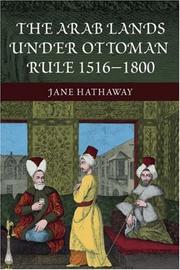| Listing 1 - 10 of 58 | << page >> |
Sort by
|
Book
Year: 2013 Publisher: Halle : Zentrum für Interdisziplinäre Regionalstudien Vorderer Orient, Afrika, Asien der Martin-Luther-Univ. Halle-Wittenberg,
Abstract | Keywords | Export | Availability | Bookmark
 Loading...
Loading...Choose an application
- Reference Manager
- EndNote
- RefWorks (Direct export to RefWorks)
Moderne. --- Kultur. --- Geschichte 1700-1820 --- Osmanisches Reich.
Book
ISBN: 9789004246065 9789004254404 Year: 2013 Volume: 53 Publisher: Leiden Brill
Abstract | Keywords | Export | Availability | Bookmark
 Loading...
Loading...Choose an application
- Reference Manager
- EndNote
- RefWorks (Direct export to RefWorks)
The European Tributary States is the first attempt to give a comprehensive overview of the similarities and differences in the Ottoman Empire's relationship to Moldavia, Wallachia, Transylvania, Ragusa, the Crimean Khanate as well as the Cossack Hetmanate
Tribut --- Geschichte 1500-1700 --- Balkanhalbinsel --- Osmanisches Reich --- Empire ottoman --- Europe --- Europe, Eastern --- Relations extérieures --- Politics and government --- Politique et gouvernement --- Empire ottoman. --- Balkanhalbinsel. --- Osmanisches Reich. --- Relations extérieures
Book
ISBN: 0822987104 9780822987109 0822945800 9780822945802 Year: 2020 Publisher: Pittsburgh, Pa.
Abstract | Keywords | Export | Availability | Bookmark
 Loading...
Loading...Choose an application
- Reference Manager
- EndNote
- RefWorks (Direct export to RefWorks)
Science in seventeenth- and eighteenth-century Istanbul, Harun Küçük argues, was without leisure, a phenomenon spurred by the hyperinflation a century earlier when scientific texts all but disappeared from the college curriculum and inflation reduced the wages of professors to one-tenth of what they were in the sixteenth century. It was during this tumultuous period that philosophy and theory, the more leisurely aspects of naturalism - and the pursuit of "knowledge for knowledge's sake" - vanished altogether from the city. But rather than put an end to science in Istanbul, this economic crisis was transformative, turning science into a practical matter, into something one learned through apprenticeship and provided as a service. In 'Science without Leisure', Küçük reveals how Ottoman science, when measured against familiar narratives of the Scientific Revolution, was remarkably far less scholastic and philosophical and far more cosmopolitan and practical. His book explains why as practical naturalists deployed natural knowledge to lucrative ends without regard for scientific theories, science in the Ottoman Empire over the long term ultimately became the domain of physicians, bureaucrats, and engineers rather than of scholars and philosophers.--
Science --- Naturalism. --- Sciences --- Naturalisme. --- History. --- Histoire. --- 1600-1699 --- Istanbul (Turkey) --- İstanbul (Turquie) --- Turkey --- Konstantinopel --- Osmanisches Reich --- History --- Histoire --- Osmanisches Reich.
Book
ISBN: 9780415444927 9780203142851 0203142853 0415444926 9780415711784 0415711789 9786613434821 1283434822 1136498958 9781136498909 9781136498947 9781136498954 Year: 2012 Publisher: Milton Park, Abingdon, Oxon ;New York Routledge
Abstract | Keywords | Export | Availability | Bookmark
 Loading...
Loading...Choose an application
- Reference Manager
- EndNote
- RefWorks (Direct export to RefWorks)
The Ottoman empire as a political entity comprised most of the present Middle East (with the principal exception of Iran), north Africa and south-eastern Europe. For over 500 years, until its disintegration during World War I, it encompassed a diverse range of ethnic, religious and linguistic communities with varying political and cultural backgrounds. Yet, was there such a thing as an 'Ottoman world' beyond the principle of sultanic rule from Istanbul? Ottoman authority might have been established largely by military conquest, but how was it maintained for so long, over such distanc
Turkey --- History --- Civilization --- 1288-1918 --- Osmanisches Reich. --- 1288-1918. --- Ottoman Empire, 1288-1918. --- Geschichte --- Geschichte. --- Kultur.

ISBN: 0582418992 9780582418998 Year: 2008 Publisher: Harlow Pearson
Abstract | Keywords | Export | Availability | Bookmark
 Loading...
Loading...Choose an application
- Reference Manager
- EndNote
- RefWorks (Direct export to RefWorks)
This title is written for students of Middle Eastern and Ottoman history, as well as scholars and general readers looking for historical background on the Arab world.
Herrschaft. --- Geschichte 1516-1800. --- Arab countries --- Arabische Staaten. --- Osmanisches Reich. --- History
Book
ISBN: 9781474443319 1474443311 1474443338 9781474443333 1474443346 9781474443340 9781474443340 Year: 2019 Publisher: Edinburgh
Abstract | Keywords | Export | Availability | Bookmark
 Loading...
Loading...Choose an application
- Reference Manager
- EndNote
- RefWorks (Direct export to RefWorks)
Explores Ottoman Sunnism from the earliest period of the empire to its end Revisionist chapters question established paradigms on Ottoman Sunnism, offering complex and nuanced understandings of the subjectContributes to the ongoing debate regarding confessionalisation in the Ottoman EmpireExplains and – where necessary – revises various understandings of Ottoman religionReflects different perspectives across the Empire, particularly from the Balkans and central heartlands Relevant to historians who study religion in Europe and Asia in the early modern world, allowing for increased comparative insightsAddressing the contested nature of Ottoman Sunnism from the 14th to the early 20th century, this book draws on diverse perspectives across the empire. Closely reading intellectual, social and mystical traditions within the empire, it clarifies the possibilities that existed within Ottoman Sunnism, presenting it as a complex, nuanced and evolving concept. The authors in this volume rescue Ottoman Sunnism from an increasingly bipolar definition that seeks to present the Ottomans as enshrining a clearly defined orthodoxy, suppressing its contrasting heterodoxy. Challenging established notions that have marked the existing literature, the chapters contribute significantly not only to the ongoing debate on the Ottoman age of confessionalisation but also to the study of religion in the Ottoman context. ContributorsNecati Alkan, University of BambergAyşe Baltacıoğlu-Brammer, New York UniversityJohn J. Curry, University of Nevada Vefa Erginbaş, Providence College Benjamin Weineck, Bayreuth University F. Betul Yavuz, independent scholar Yasir Yılmaz, Palacký University Rıza Yıldırım, Emory University
Sunniten. --- Sunnites --- Sunnites. --- History --- 1288-1918. --- Osmanisches Reich. --- Turkey --- Turkey. --- History. --- 1288-1918
Book
Year: 1958 Publisher: Amsterdam : Djambatan,
Abstract | Keywords | Export | Availability | Bookmark
 Loading...
Loading...Choose an application
- Reference Manager
- EndNote
- RefWorks (Direct export to RefWorks)
Arabs. --- Einigung. --- Araber. --- Osmanisches Reich. --- Turkey --- Turquía --- Ägypten. --- Politics and government. --- Política y gobierno.

ISBN: 9754280150 9789754280159 Year: 1990 Publisher: Istanbul : Isis Press,
Abstract | Keywords | Export | Availability | Bookmark
 Loading...
Loading...Choose an application
- Reference Manager
- EndNote
- RefWorks (Direct export to RefWorks)
Geschichte (1300-1481). --- Geschichte --- Middle Ages. --- Empire ottoman --- Osmanisches Reich. --- Turkey --- Turquie --- Histoire. --- History --- Histoire
Book
Year: 1904 Publisher: London, : Newnes,
Abstract | Keywords | Export | Availability | Bookmark
 Loading...
Loading...Choose an application
- Reference Manager
- EndNote
- RefWorks (Direct export to RefWorks)
Alltag. --- Gesellschaft. --- Manners and customs. --- Osmanisches Reich. --- Turkey --- Turkey. --- Social life and customs.
Book
ISBN: 9789756372395 9756372397 Year: 2007 Publisher: Istanbul Eren
Abstract | Keywords | Export | Availability | Bookmark
 Loading...
Loading...Choose an application
- Reference Manager
- EndNote
- RefWorks (Direct export to RefWorks)
Soup kitchens --- Soup kitchens. --- Volksküche. --- Armenspeisung. --- History --- Geschichte. --- Turkey. --- Osmanisches Reich.
| Listing 1 - 10 of 58 | << page >> |
Sort by
|

 Search
Search Feedback
Feedback About UniCat
About UniCat  Help
Help News
News